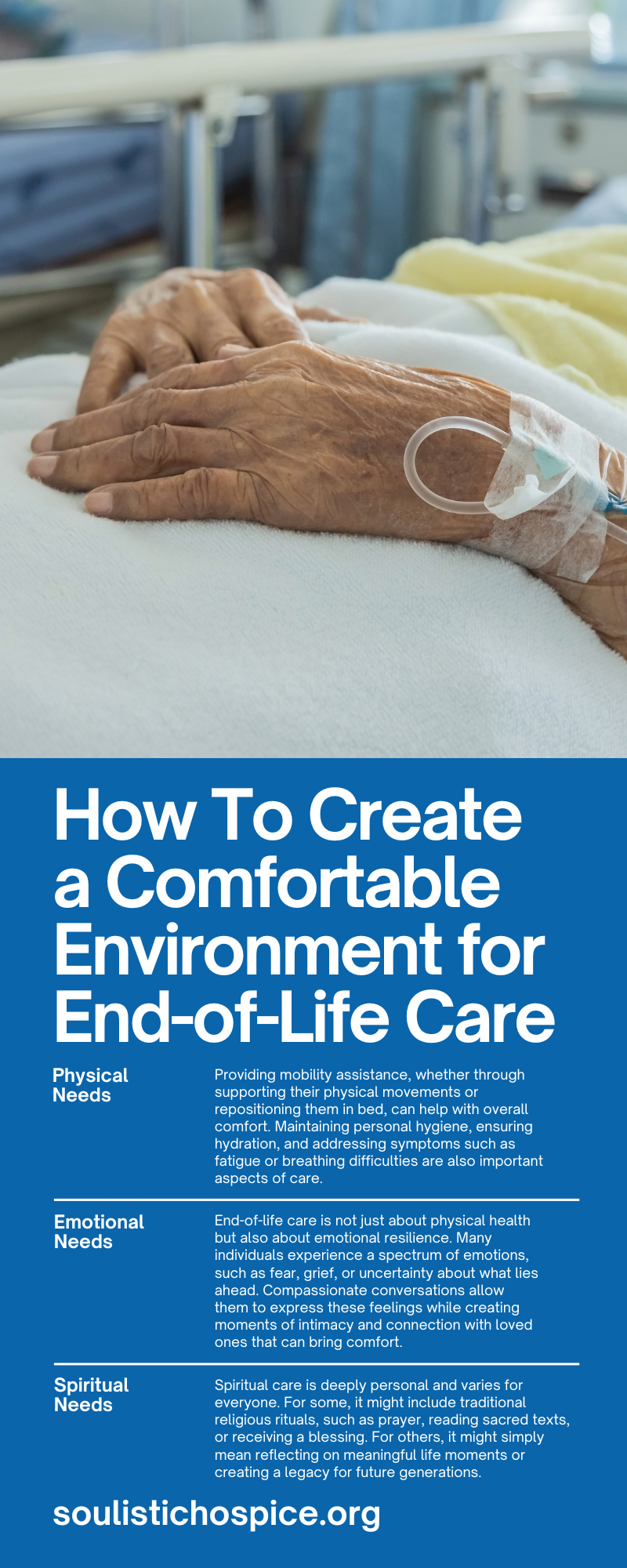
Supporting someone through the final stages of life is one of the most profound and emotional journeys we can undertake. For caregivers and loved ones, ensuring that the person receives compassionate, quality end-of-life care is essential to honoring their life and safeguarding their dignity.
This guide explores how to create a comfortable environment for end-of-life care, tailoring it to meet the individual's physical, emotional, and spiritual needs. Whether you are a family member, friend, or primary caregiver, this information will equip you to provide the love and support that matters most during this time.
What Is End-of-Life Care?
End-of-life care refers to the specialized support given to individuals in the final phase of a terminal illness, focusing on enhancing quality of life rather than prolonging it. This care encompasses physical comfort, emotional well-being, spiritual peace, and fulfilling personal needs and preferences.
Depending on their specific resources and wishes, the care can occur in various settings, including the individual's home, a hospice, or a care facility. The overarching goal is to ensure that the individual is treated with dignity and compassion, making their remaining time as meaningful and peaceful as possible.
Understanding the Needs of Patients in End-of-Life Care
Every person in end-of-life care has unique physical, emotional, and spiritual needs. Recognizing and addressing these needs plays a significant role in providing comprehensive care and fostering an environment of respect and understanding.
Physical Needs
Caring for someone’s physical well-being is central to this process. Proper pain management is essential to alleviate discomfort and preserve dignity. This may involve medications, gentle massage, or non-medical techniques such as using warm compresses.
Providing mobility assistance, whether through supporting their physical movements or repositioning them in bed, can help with overall comfort. Maintaining personal hygiene, ensuring hydration, and addressing symptoms such as fatigue or breathing difficulties are also important aspects of care.
Emotional Needs
End-of-life care is not just about physical health but also about emotional resilience. Many individuals experience a spectrum of emotions, such as fear, grief, or uncertainty about what lies ahead. Compassionate conversations allow them to express these feelings while creating moments of intimacy and connection with loved ones that can bring comfort.
For some, sharing stories or sensing the simple presence of a familiar voice can offer reassurance and calm. Emotional needs can also be addressed through access to counselors, support groups, or someone listening without judgment.
Spiritual Needs
Spiritual care is deeply personal and varies for everyone. For some, it might include traditional religious rituals, such as prayer, reading sacred texts, or receiving a blessing. For others, it might simply mean reflecting on meaningful life moments or creating a legacy for future generations.
Spiritual care ensures that individuals feel at peace with themselves and their beliefs. Providing opportunities for quiet reflection, meditation, or guided spiritual counseling is valuable, as is showing respect for the person’s practices, traditions, and choices.
How Environment Impacts End-of-Life Care
The physical and emotional environment plays a crucial role in shaping the overall end-of-life care experience, often influencing how individuals and their loved ones navigate this profoundly personal journey. A poorly arranged or cold, impersonal space can unintentionally heighten stress, discomfort, or feelings of isolation. On the other hand, a warm, nurturing environment can foster a sense of comfort, peace, and even connection, helping to ease the challenges of this stage of life.
Key elements of the environment, such as soft, adjustable lighting, reduced noise levels, and the inclusion of personal touches such as family photos, favorite blankets, or meaningful objects, can significantly impact both physical relaxation and emotional well-being. These small yet thoughtful details help personalize the space, transforming it from a sterile setting into one that feels familiar and reassuring.
Being intentional about creating a calming, welcoming atmosphere is essential for the individual receiving care as well as for their loved ones, who may be navigating a range of emotions. This intentionality supports the preservation of dignity, enhances the overall quality of care, and fosters opportunities for meaningful moments, conversations, and connections during this tender and often profound stage of life.
Creating a Comfortable End-of-Life Care Environment
Creating the right environment is about thoughtful, compassionate touches that focus on the well-being and preferences of the individual. Here are a few ways to ensure they feel genuinely cared for at every level.
Ensure Physical Comfort
Start with the basics of physical comfort. Provide a supportive, adjustable bed or layer of soft pillows and blankets to ensure they feel cozy and well-positioned. Adjusting the room’s temperature is also essential, as frailty often leaves individuals feeling too cold or warm. These adjustments can make an enormous difference in their comfort.
Maintain a Peaceful Environment
A calm, tranquil environment contributes significantly to relaxation. Lower noise levels by avoiding loud conversations, silencing electronic devices, or including soothing background music. Soft, warm lighting can also enhance the ambiance. These simple additions can create a sanctuary that feels safe and nurturing.
Offer Emotional Support
Being emotionally present can be one of the greatest gifts you give. Spend time listening to their thoughts and needs, however small or intangible they might seem. Share conversations that spark joy or explore meaningful memories together. Often, providing company, whether through holding hands or simple proximity, can be deeply comforting.
Personalize the Space
Infuse a sense of familiarity by surrounding the individual with cherished personal items. Favorite photographs, mementos, or meaningful music can bring joy and a sense of belonging. Small personal touches such as a favorite scented candle or a quilt with sentimental value can go a long way in making the environment truly theirs.
Provide Access to Pain Management
A significant aspect of end-of-life care is ensuring the individual is free from avoidable pain. Work closely with healthcare professionals to ensure proper medications, therapies, or other interventions are administered correctly. Regular conversations with a medical provider can assure you’re taking the necessary steps to manage discomfort effectively.
Respect Individual Preferences
Every aspect of the person’s care should reflect their unique wishes. Whether it involves meal choices, daily routines, or specific spiritual practices, honoring their preferences is a deeply compassionate gesture. These decisions empower the person to retain autonomy and control their care experience.
Empowering Loved Ones and Caregivers to Provide Comfort
Creating a comfortable environment for end-of-life care is ultimately about ensuring that the individual feels safe, honored, and supported during this significant chapter of their life.
If you’re feeling overwhelmed and need guidance, know that professional hospice care can provide invaluable support. At Soulistic Hospice, we’re dedicated to helping families create customized care plans through our personal care hospice services that prioritize comfort and peace.
Contact us today to learn how Soulistic Hospice can assist you in creating the meaningful environment your loved one deserves. Together, we can make their final moments as dignified and serene as possible.









